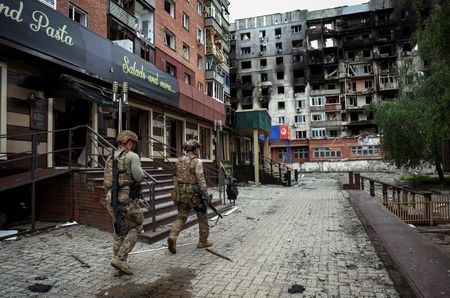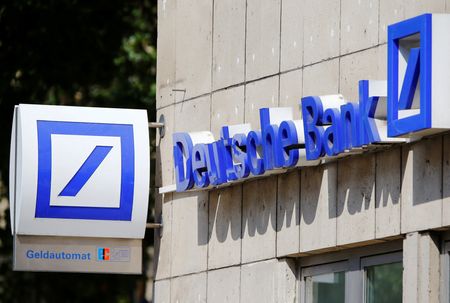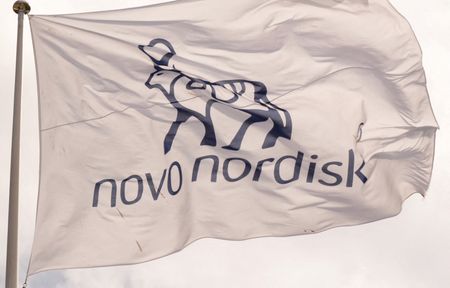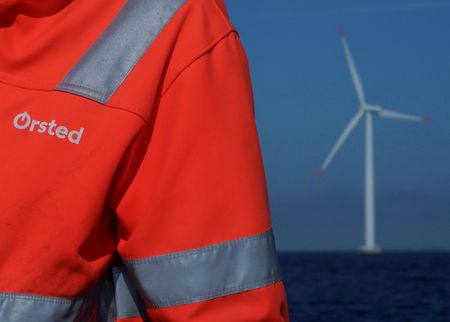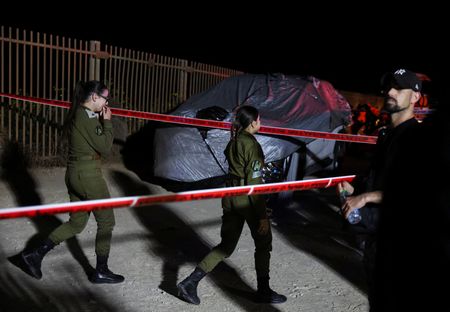By Andrew Osborn and Guy Faulconbridge
MOSCOW (Reuters) -Russia said on Wednesday that its forces were advancing north inside Pokrovsk in a drive to take full control of the Ukrainian city, but the Ukrainian army said its units were battling hard to try to stop the Russians from gaining new ground.
Ukraine has acknowledged that its troops face a difficult position in the strategic eastern city, once an important transport and logistics hub for the Ukrainian army, which Russia has been trying to capture for more than a year.
Russia sees the city as the gateway to its capture of the remaining 10%, or 5,000 square km (1,930 square miles) of Ukraine’s eastern industrial Donbas region, one of its key aims in the almost four-year-old war.
The Russian defence ministry said two assault groups were destroying Ukrainian troops that were surrounded in several districts of the city and continuing an offensive pushing north through it. Russian forces were clearing Ukrainian troops from settlements on Pokrovsk’s southeastern flank and had repelled Ukrainian attempts to break out of encirclement.
The Ukrainian military denied that its troops were surrounded in Pokrovsk. It said they were trying to stop Russian soldiers from digging in while seeking to secure and protect logistics routes in the wider area.
“Measures are being taken to block the enemy, which is attempting to infiltrate and accumulate in the city of Pokrovsk,” the Ukrainian General Staff said in a statement.
“Active countermeasures are being taken against attempts by enemy infantry groups to gain a foothold.”
Ukrainian President Volodymyr Zelenskiy said on Monday the area around Pokrovsk remained under severe pressure but that up to 300 Russian servicemen still in the city had made no gains in the past day and there were just 60 in another city, Kupiansk.
The Russian Defence Ministry said on Wednesday that either Zelenskiy had no grasp of what was happening or he was deliberately trying to conceal the parlous situation for Kyiv’s forces.
Ukrainian units were trapped in “cauldrons” in both locations, it said, and their position was deteriorating rapidly while Russian forces advanced, “leaving no chance for Ukrainian servicemen to save themselves other than by voluntary surrender”.
Reuters was unable to verify either side’s assertions because of restrictions on access to the battlefield from both sides.
PLATFORM TO DRIVE NORTH
Moscow says capturing Pokrovsk would give it a platform to drive north towards the two biggest remaining Ukrainian-controlled cities in Donetsk – Kramatorsk and Sloviansk. It would give Moscow its most important single territorial gain inside Ukraine since it took the ruined city of Avdiivka in early 2024.
In a break from the frontal assaults which Russian forces have used against other cities, Russia has used pincer movements to almost encircle Ukrainian forces in both Pokrovsk and the city of Kupiansk while small highly-mobile units and drones disrupted logistics and sowed chaos behind Ukrainian lines.
Russia’s tactics in both locations have created what Russian military bloggers call a grey zone of ambiguity where neither side had full control, but which was extremely difficult for Ukraine to defend.
Open-source battlefield maps show that Russian forces are a few kilometres away from fully encircling Pokrovsk, known by Russia as Krasnoarmeysk, and control a significant part of Kupiansk where they are advancing on the main road to the city.
Pokrovsk, a road and rail hub in Ukraine’s eastern Donetsk region, had a pre-war population of some 60,000 people. But most people have now fled, all children have been evacuated and few civilians remain amid its pulverised apartment buildings and cratered roads.
As well as trying to take the whole of Donbas, Russia has been making gradual advances in the Kharkiv and Dnipopetrovsk regions further west.
Russia’s military says it now controls more than 19% of Ukraine, or some 116,000 square km (44,800 square miles).
Ukrainian maps also show Russian control at around 19% of Ukraine, up around 1 percentage point from Moscow’s position two years ago.
(Reporting by Reuters Moscow Buro and Reuters Kyiv Buro; Writing by Guy Faulconbridge/Andrew Osborn; Editing by Mark Trevelyan and Philippa Fletcher)

